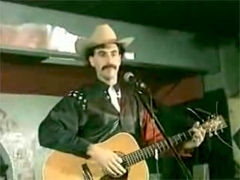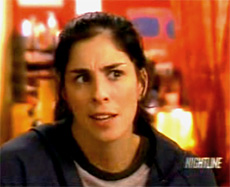
| ||||
|
Introduction This segment begins with establishing shots of an illuminated outdoor sign identifying the "Country West Dancing and Lounge" as its nighttime location, which we soon learn is in Tucson, Arizona when the mistress of ceremonies announces Borat and his Cowboy-Astana Band and calls upon the guests to give a nice hoot-'n-holler welcome to the performers who have come all the way from Kazakhstan. Borat is then seen climbing onto the stage amidst applause and cheers, and after several shots of patrons - one expectantly looking up at him, the other looking rather grim and unfriendly - Borat again appears in frame and says: Thiisa song is called a Nemobozorbicha Domovan. It mean "In my country there is a problem. After hoots and cheers, he then proceeds to sing, with a number of people in the audience eventually beginning to clap and finally joining gleefully in the singing of the repeated verses marked here in italics.
Shots of the audience happily clapping and singing along make it clear that the participation of many of the patrons is wholehearted, and at one point even smilingly accompanied by a gesture illustrating the verse "You must grab him by his horns." And the number ends with a total shot of the grinning public cheering and applauding. What this segment appears to show is that instead of recoiling in horror and indignation from an encouragement to "throw the Jew down the well," the patrons of this Arizona lounge are only too happy to join in the refrain, their applause and cheerful participation apparently signifying an unqualified approval of the violently anti-Semitic sentiment expressed in the song. In this way, the Borat performance is presumed to be as troubling as it is funny, in that it seems to show that virtually all the patrons in an Arizona lounge are not only potentially anti-Semitic but also unashamed to embrace that outlook openly in response to even a most ridiculous form of encouragement. This segment of Da Ali G Show might be criticized in at least three different ways, which will now be considered one at a time along with possible counter-arguments. 1. MALICIOUS DECEPTION
Though Brooks doesn't mention the "Throw the Jew down the well" segment from Da Ali G Show, his comments are eminently applicable to the staging and purposes of that performance. However, if in fact that segment shows what it implicitly claims to show - an audience eagerly responsive to what Jody Rosen has called an "incitement to pogrom" [4] - then it could be argued that the deception and snobbery involved were justified by what the performance alarmingly revealed, which according to Rosen is:
Or in Sacha Baron Cohen's own words
And as Cohen subsequently explains, he considers an indifference to anti-Semitism to be as much a cause for alarm as anti-Semitism itself. But precisely because assertions regarding an overriding revelatory function of this performance rest in turn on assumptions as to what actually happened in that Tucson lounge, and more specifically as to why the patrons cheerfully sang along, we will have to reserve judgment on the issue at hand until a later point in this discussion when those assumptions will be examined in some detail. 2. UNINTENTIONAL PERPETUATION OF STEREOTYPES
The same worry, that Cohen's Borat may actually serve to promote anti-Semitism for some members of the viewing public, was echoed in a subsequent ADL press release about the Borat film of 2006:
Commenting on this press release, Jim Hoberman accurately pinpointed the essentials when he wrote of the ADL: "Their real anxiety is that by satirizing anti-Semitism, Borat will legitimize it." [8] In other words, it would be ironic if the ease with which the Borat persona openly and comfortably espouses anti-Semitic views enabled a susceptible segment of the viewing public to feel unashamed about doing the same. Commentators arguing in Cohen's defense were quick to point out that Borat is in the same respected tradition as the bigoted Archie Bunker figure played by Carroll O'Connor in All in the Family (1971-1979); and that figure was named by Bravo in 2005 as the number one all-time greatest TV character. [9] On the other hand, much of the vitality of that TV series resulted from the interplay of Archie Bunker with his left-wing son-in-law, Michael "Meathead" Stivic (Rob Reiner), while the Borat figure is not - and could not be - counter-balanced in Cohen's performances by an appealing character who criticizes Borat's racist views. There are always risks involved when a comic brings to life a persona whose statements are intended to be understood by the viewing public as unacceptable. In other words, there is a danger that the comic's own person be confused with a persona played for laughs, particularly when a deadpan delivery is used and there are no obvious visual or vocal cues to set the persona apart from the person playing the role. This was the case when during a 2001 appearance on Late Night with Conan O'Brien, Sarah Silverman pretended to explain how she once got out of jury duty. She later retold the story on ABC Nightline in this way:
Though Silverman only pretended not to realize that she was uttering a racist slur, and though the joke was intended to be at the expense of the mindless persona she was playing for comic effect, The Media Action Network of Asian Americans demanded an apology, and one was issued both by NBC and Conan O'Brien, but not by Silverman who maintained that what she told was not a racist joke but rather a joke about racism. With Borat singing "Throw the Jew down the well," in contrast to the Sarah Silverman story cited above and her deadpan delivery, numerous cues - including a fake mustache, over-the-top accent, crude lyrics that neither rhymed nor fit the music, a patently unprofessional singing voice - should have lowered the risks of not realizing that a persona was in play, at least for some percentage of the patrons at Country West. And this leads us to the final and in some ways most serious of the three critiques. 3. MISREPRESENTATION One issue concerns exactly what transpired between the time "Borat and his Cowboy-Astana Band" were introduced, and the singing of the explicitly anti-Semitic verses and choruses. The impression given in the 2 min. 46 sec. segment is that the only intervening action was the singing of a verse and chorus about "transport." But statements made by people who were there at the Country West that night and which are cited in the two articles make it clear that "Borat" also sang verses about throwing his wife and family and his wife's cooking down the well, and that the entire performance lasted several hours. This of course is significant if these other portions of the song were sung before the explicitly anti-Semitic section, for the simple reason that they would have served to tip off at least some of the patrons that the entire performance was a joke. For example, Nathaniel Popper quotes Carol Pierce, described as "the treasurer of the company that owns the bar," and who "could be seen during the segment on HBO, laughing heartily behind her goateed husband, " as pointing out
And Curtis McCrary quotes a Carole Irizarry "who supervises the bar, along with her husband, Robert," as stating that "everyone was in on the joke." McCrary adds:
That not absolutely everyone was in on the joke seems clear. For example, even after watching the segment on HBO, Bill Sandy, the manager of Country West, "still did not appear to grasp that Borat was simply a character, created and portrayed by a comedian from Britain" (Popper). And Sacha Baron Cohen reportedly said that one of the patrons told him after the show: "You know, Borat, I'm from Texas; you better see how we treat the Jews down there" (McCrary, citing a statement made by Cohen on a Howard Stern broadcast). But it seems equally clear that a significant number of the patrons were in on the joke, and even if we have no way of assessing whether they constituted 25 or 50 or 75 percent of the people who cheerfully sang along, the impression given in the edited segment that the very act of joining in the singing revealed latent anti-Semitism, is almost certainly misleading. And although in the general pattern of deceptions carried out in the guise of Borat, the television viewer and Sacha Baron Cohen are knowing confederates enjoying the discomfiture or naïveté of an unsuspecting stooge, in the case of "Throw the Jew down the well" it would appear in retrospect that a different configuration was in play, with a number of the apparent stooges playing along with the joke, and the TV viewer - for being led to think otherwise - the real victim of a deception. | ||||
| ||||
| ||||
